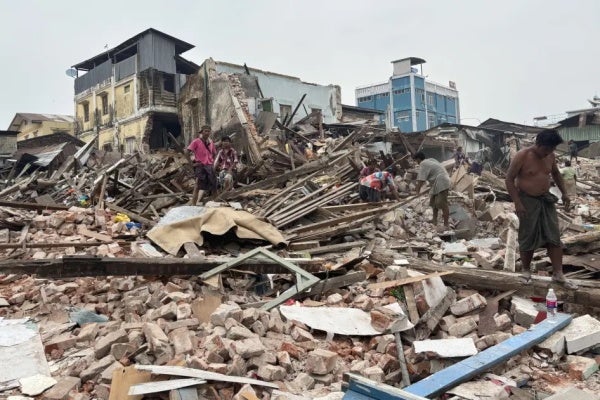Lire la version en français / Hier auf Deutsch lesen/ Lea la versión en español
When a devastating natural disaster hits a country, you’d assume that country’s leaders would do everything they can to help survivors.
However, in the case of Myanmar’s junta, you’d be wrong.
On March 28, a serious earthquake rocked the southeast Asian country. Media reports put the death toll at more than 5,000, but some estimates say the true figure could be double that. The United Nations says two million people affected by the quake need assistance.
But rather than trying to help survivors, the junta is actually obstructing access to lifesaving services for many – particularly those in opposition-held areas and during military operations.
This is unfortunately nothing new in Myanmar under the junta. Since the coup in 2021, the military has been relentlessly undermining the healthcare system in opposition areas.
Prior to the earthquake, aid blockages and a lack of access to medical care had already exacerbated malnutrition and disrupted child vaccination programs. There’s been a rise in communicable diseases like tuberculosis and cholera.
Making matters worse, the military junta has for years conducted unlawful attacks on healthcare facilities and health workers. The military and associated forces have hit more than 250 healthcare facilities and killed scores of health workers since the coup.
The junta has also arrested and prosecuted hundreds of health workers affiliated with the anti-coup movement and closed private hospitals that hire them. Many health workers have fled the country to avoid arrest.
The scale of Myanmar’s healthcare crisis is staggering. Remember those two million people who need assistance today following last month’s earthquake? They represent only a tenth of the challenge. Prior the quake, there were nearly 20 million people who already needed aid.
In other words, long before the natural disaster struck last month, Myanmar had already been hit hard by the unnatural disaster of the military junta.
The international response to the earthquake has fallen short. Foreign aid has dropped drastically. Only 7.5 percent of the UN’s humanitarian relief appeal has been funded.
The sharp decline stems in part from the US government’s abrupt dismantling of foreign aid. The US provided 30 percent of aid in 2024, three percent after the cuts. The three USAID workers sent to Myanmar to assess the earthquake were fired days after arriving.
Other governments picking up the slack – providing aid and support – need to understand the wider contexts outlined above. They should, at the very least, call on the junta to stop its airstrikes and other unlawful attacks targeting healthcare facilities and health workers.
They should also insist the junta stops blocking aid, so it can get through to all the millions of people who need it.






